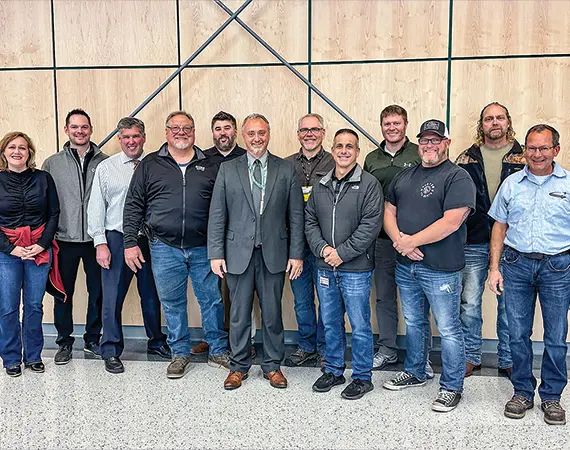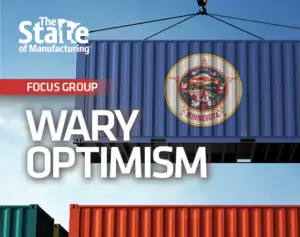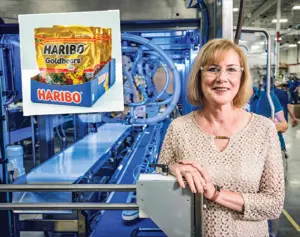Manufacturers in northwest Minnesota say they confront challenges that go beyond hiring and retaining qualified workers. They contend with a range of employees’ needs from health and housing to daycare and quality of life. If you build it, they may come, but they won’t stay if there’s no place to live or no daycare for their children.
The Northwestern Minnesota Manufacturers Association (NMMA) is a 50-year-old alliance of manufacturers who share concerns and challenges and explore solutions. They know that working together is essential for advancing their companies and sustaining strong communities.
NMMA’s membership includes Polaris Industries, Marvin, Security State Bank, Citizens State Bank, Border Bank, Central Boiler/Altoz, Karl Manufacturing Solutions/Heatmor and Intercept Industries LTD. Mark Karl, current president of the NMMA and CEO of Karl Manufacturing Solutions in Roseau, says the organization convenes 10 times a year to focus on common challenges and explore possible solutions.
“Although we certainly compete for some of the same employees, we have a deep respect for each other and understand that manufacturing is the largest driver of our local economies and community viability,” says Mike Roberts, director of operations support for Marvin in Warroad.
Karl says NMMA’s networking helped its members navigate the pandemic: “We did a lot of cross communication during COVID about what we were implementing, how we were handling the six feet of separation, the cleaning, the sanitizing.” But post-COVID issues are long-term, expensive challenges to tackle.
“We’re focused on the health of our communities, housing and daycare,” Karl says. “Supporting youth and youth activities is important. Our organization supports things like robotics programs and industrial education programs — welding, injection molding, machining.”
During a recent focus group in Roseau as part of Enterprise Minnesota’s annual State of Manufacturing® work , Enterprise Minnesota President and CEO Bob Kill emphasized that companies in small, northern communities can’t just deal with one issue at a time; rather, they need to address the health, education, and financial needs of those communities and the region as a whole. Kill led the meeting through a series of issues from hiring, housing, and flexible scheduling to effects of new legislation and applications of AI.
Participants shared information about recruiting and retaining employees.
Northwest manufacturers provide opportunities for young people to explore manufacturing while they’re still in high school through tours, job shadowing, and job fairs. They also provide avenues for current employees to get additional training to move into new roles within the company.
In January 2022, Marvin partnered with Northland Community & Technical College in East Grand Forks to launch the Advanced Resource Center (ARC), an accredited mechatronics program in Warroad MN.
“We’ve had on-site college programs for 25 years,” says Peggy Anderholm, education manager of the ARC. Anderholm herself has a 25-year work history with Marvin, having started its training department in 1998. She says that five years ago Marvin started to explore ways to open up these programs for the greater community.
“We wanted to help develop a degree program for all northwest Minnesota industries to scale up their workforces and provide skills to incoming employees. We have jobs,” she says. “We just don’t have people.”
Marvin provided the building in Warroad and a private funder financed the equipment. Businesses offer assisted or reimbursed tuition while their workers learn new skills and earn certificates and degrees.
But there are more jobs available than can be filled from within the communities. Companies like Central Boiler/Altoz use a variety of recruitment strategies. Human Resources Manager Jarod Reierson says, “We use a lot of ads, also boots on the ground and local parades — we’ve walked in so many parades over the last two years — handing out info on our hiring bonus, who we are, also radio ads, college career fairs, and referral bonuses.”
“If we can bring 10 new people into one of the communities, that’s 10 fewer local people we’re competing for,” Karl says. “And that’s a good thing for all of us.”
But bringing in new people means meeting needs for housing and daycare, too. Some manufacturers are investing in the construction of new apartment buildings. Karl has purchased a building in Roseau for his business that might house a daycare for 20-28 children. He says he’ll offer the space rent free to a daycare provider.
Daycare is an issue, especially for 0-2 year olds, says Kellie Roth, senior HR manager for Polaris. Some workers, she says, who are unable to find daycare take advantage of flexible scheduling, working night shifts while their spouses work days.
Eric Etherington, Central Boiler’s finance director and mayor of Greenbush, says the community is on track for a $1 million congressional grant to construct a local daycare facility that would accommodate 70 children including 16 infants. “We’re waiting for those budgets to be finalized and signed by the President for next year,” he says. “At that point things will start to move really fast.”
The community hopes to have the facility constructed and open prior to the start of the 2024-25 school year, Etherington says. The daycare facility could also serve commuters who drive through Greenbush to get from their homes to jobs in other communities.
Other solutions to ongoing challenges include recruitment of immigrant employees, automation, and AI applications for identifying flaws in products and projecting markets.
“Nothing,” says Roth, “is off the table.”
Kill says the challenge facing manufacturers still boils down to workforce, workforce, workforce. “These northwestern manufacturers will do almost anything to keep people. They’re going to automate where they can; the technology, the automation that they’ve invested in is really phenomenal.”
Contrary to popular belief, he adds, the Minneapolis-St. Paul metropolitan area is not the only place with sophisticated manufacturing. “The farther you get away from the Twin Cities, the more advanced companies are in their employee retention work, their commitment to their employees, and their commitment to new technology.”
Kill is impressed by the sense of community in the northwest corner. “It’s almost undefinable to people who have never visited. This focus group showed what an off-the-scale commitment there is here to keeping the vibrancy of their companies and communities.”


